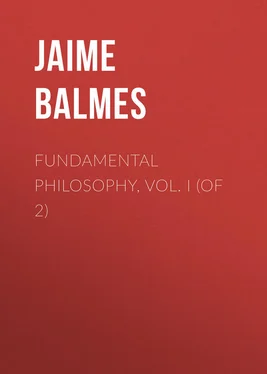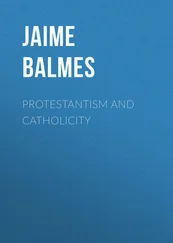Jaime Balmes - Fundamental Philosophy, Vol. I (of 2)
Здесь есть возможность читать онлайн «Jaime Balmes - Fundamental Philosophy, Vol. I (of 2)» — ознакомительный отрывок электронной книги совершенно бесплатно, а после прочтения отрывка купить полную версию. В некоторых случаях можно слушать аудио, скачать через торрент в формате fb2 и присутствует краткое содержание. Жанр: foreign_antique, foreign_prose, на английском языке. Описание произведения, (предисловие) а так же отзывы посетителей доступны на портале библиотеки ЛибКат.
- Название:Fundamental Philosophy, Vol. I (of 2)
- Автор:
- Жанр:
- Год:неизвестен
- ISBN:нет данных
- Рейтинг книги:3 / 5. Голосов: 1
-
Избранное:Добавить в избранное
- Отзывы:
-
Ваша оценка:
- 60
- 1
- 2
- 3
- 4
- 5
Fundamental Philosophy, Vol. I (of 2): краткое содержание, описание и аннотация
Предлагаем к чтению аннотацию, описание, краткое содержание или предисловие (зависит от того, что написал сам автор книги «Fundamental Philosophy, Vol. I (of 2)»). Если вы не нашли необходимую информацию о книге — напишите в комментариях, мы постараемся отыскать её.
Fundamental Philosophy, Vol. I (of 2) — читать онлайн ознакомительный отрывок
Ниже представлен текст книги, разбитый по страницам. Система сохранения места последней прочитанной страницы, позволяет с удобством читать онлайн бесплатно книгу «Fundamental Philosophy, Vol. I (of 2)», без необходимости каждый раз заново искать на чём Вы остановились. Поставьте закладку, и сможете в любой момент перейти на страницу, на которой закончили чтение.
Интервал:
Закладка:
118. We would here make the following remarks necessary to avoid equivocations.
I. We do not assert a necessary relation between identity and representation; for this would make every being representative, since every being is identical with itself. We establish this proposition: identity may be the origin of representation; but we deny the two following: identity is the necessary origin of representation; representation is a sign of identity.
II. We determine nothing as to the application of the relations between representation and identity, so far as finite beings are concerned.
III. We abstract the duality which results from supposing only subject and object, and enter into no question on the nature of this duality.
119. These ideas being fixed, we may observe that we have an incontestable proof that there is no intrinsic repugnance between identity and representation in two dogmas of the Catholic religion: the beatific vision and the divine intelligence. The dogma of the beatific vision teaches us that the human soul in the mansion of the blessed is intimately united to God, and sees him face to face in his very essence. No one ever said that this vision was made by the medium of an idea, but theologians, and among them St. Thomas, expressly teach the contrary. We have then identity united with representation, that is, the divine essence representing, or rather presenting, itself to the eyes of the human mind. The dogma of divine intelligence teaches that God is infinitely intelligent. God does not need to go out of himself, nor employ distinct ideas in order to understand; he sees himself in his essence. Here, too, identity is united with representation, and the intelligent being identified with the thing understood. (11) Конец ознакомительного фрагмента. Текст предоставлен ООО «ЛитРес». Прочитайте эту книгу целиком, купив полную легальную версию на ЛитРес. Безопасно оплатить книгу можно банковской картой Visa, MasterCard, Maestro, со счета мобильного телефона, с платежного терминала, в салоне МТС или Связной, через PayPal, WebMoney, Яндекс.Деньги, QIWI Кошелек, бонусными картами или другим удобным Вам способом.
CHAPTER XII.
IMMEDIATE INTELLIGIBILITY
120. Neither active nor passive representation can be predicated of all things; we mean to say, that there are some beings which are not endowed with intellectual activity, and cannot be even passively the object of the acts of the intellect.
As regards the power of active representation, which is at bottom only the faculty of intelligence, it is evident that many beings are destitute of it. There may be greater difficulty with regard to passive representation, or the fitness to be the immediate object of the intellect.
121. An object cannot be known immediately, that is, without the mediation of an idea, if it do not itself perform the functions of this idea, and unite itself to the intellect which is to know it. This alone takes from all material objects the character of being immediately intelligible : so that if a mind be imagined having no idea of the corporeal universe, it could know nothing of it, although for all eternity in the midst of it.
Hence it follows that matter neither is, nor can be, intelligent or intelligible: the ideas which we have of it come from another source; without them we might be united to matter, and never know or even suspect its existence.
122. An opportunity is here presented of explaining an exceedingly curious doctrine of St. Thomas. This eminent metaphysician was of opinion that it required greater perfection to be immediately intelligible than to be intelligent; so that the human mind, although endowed with intelligence, does not possess intelligibility.
In his Summa Theologica , 6 6 P. 1a, Q. 87a, A. 1o
the holy Doctor asks if the soul knows itself by its essence, and answers that it does not, and thus defends his position:
"Things are intelligible accordingly as they act, and not as they have the power to act, as is said in the ninth book of Metaphysics (tex. 20 tr. 3). For any thing that comes under knowledge is being, is the true, in so far as it is in act, and this is manifestly apparent in sensible things. Thus the sight does not perceive that which may be colored, but that only which actually is colored. And in the same manner as is manifest, the intellect, in so far as it knows material things, knows that only which is in act… Hence, also, in immaterial substances, each one is intelligible by its essence, accordingly as it is in act by its essence. Therefore, the essence of God, which is a pure and perfect act, is absolutely and perfectly intelligible by itself; thus God knows, by his essence, not only himself but also all other things. But the essence of the angel belongs to the class of intelligible beings as an act, but not as a pure and complete act, wherefore his understanding is not completed by his essence. For, although the angel knows himself by his essence, he cannot know all things by his essence, but knows those distinct from himself only by their images. But the human intellect in the class of intelligible beings is only a possible being… Therefore, considered in its essence, it is an intelligent power; hence of itself it has the faculty of understanding, but not of being understood, except inasmuch as it acts. On this account the Platonists placed the order of intelligible beings above the order of intellect; because the intellect understands only by participation of the intelligible; but according to them, that which participates is beneath that of which it participates. If, then, the human intellect places itself in act by the participation of separate intelligible forms, as the Platonists held, it would know itself by this participation of incorporeal things. But as it is natural to our intellect in the present life to look to material and sensible things, it follows that our intellect knows itself only as it is placed in act by the species (ideas) abstracted from sensible things by the light of the intellect acting, which is the act of the intelligible things themselves… Therefore our intellect does not know itself by its essence but by its acts."
Such is the doctrine of St. Thomas. Cardinal Cajetan, one of the most penetrating and subtile minds that ever existed, has a commentary on this passage, worthy of the text. These are his words: "Two things expressly follow, from what is said in the text. The first is, that our intellect has of itself the faculty of understanding. The second is, that our intellect has not of itself the faculty of being understood. Hence the order of intellect is below the order of intelligible beings. For if the perfection, which our intellect has of itself, is sufficient to understand, but not to be understood, it necessarily follows that greater perfection is required in a thing to be understood than to understand. And because St. Thomas saw this consequence, which at first sight does not seem true, and might even be objected to him, he excludes this apprehension, by showing that this must be admitted to be true not only by the Peripatetics, from whose doctrine it results, but also by the Platonists."
But afterwards, in answer to an objection brought by Scotus, called the Subtle Doctor, he adds: "But because in order to understand an intellect and an intelligible object are required, and the relation of the intellect to the intelligible, is the relation of the perfectible to its perfection, since the intellect in act consists in its being itself the intelligible thing, as is evident from what has been said above; it follows that immaterial beings are divided into two orders, intellects, and things intelligible. And as the intelligible consists in perfective immateriality, it follows that any thing is intelligible inasmuch as it is immaterially perfective. That intelligibility requires immateriality is shown by this, that no material thing is intelligible, unless, inasmuch as it is abstracted from matter… It has already been shown that any thing is intelligible by this, that not only itself, but others, also, are in the intelligible order, either in act or in potentiality; it is thus nothing more than to be perfected or perfectible by the intelligible."
Читать дальшеИнтервал:
Закладка:
Похожие книги на «Fundamental Philosophy, Vol. I (of 2)»
Представляем Вашему вниманию похожие книги на «Fundamental Philosophy, Vol. I (of 2)» списком для выбора. Мы отобрали схожую по названию и смыслу литературу в надежде предоставить читателям больше вариантов отыскать новые, интересные, ещё непрочитанные произведения.
Обсуждение, отзывы о книге «Fundamental Philosophy, Vol. I (of 2)» и просто собственные мнения читателей. Оставьте ваши комментарии, напишите, что Вы думаете о произведении, его смысле или главных героях. Укажите что конкретно понравилось, а что нет, и почему Вы так считаете.












